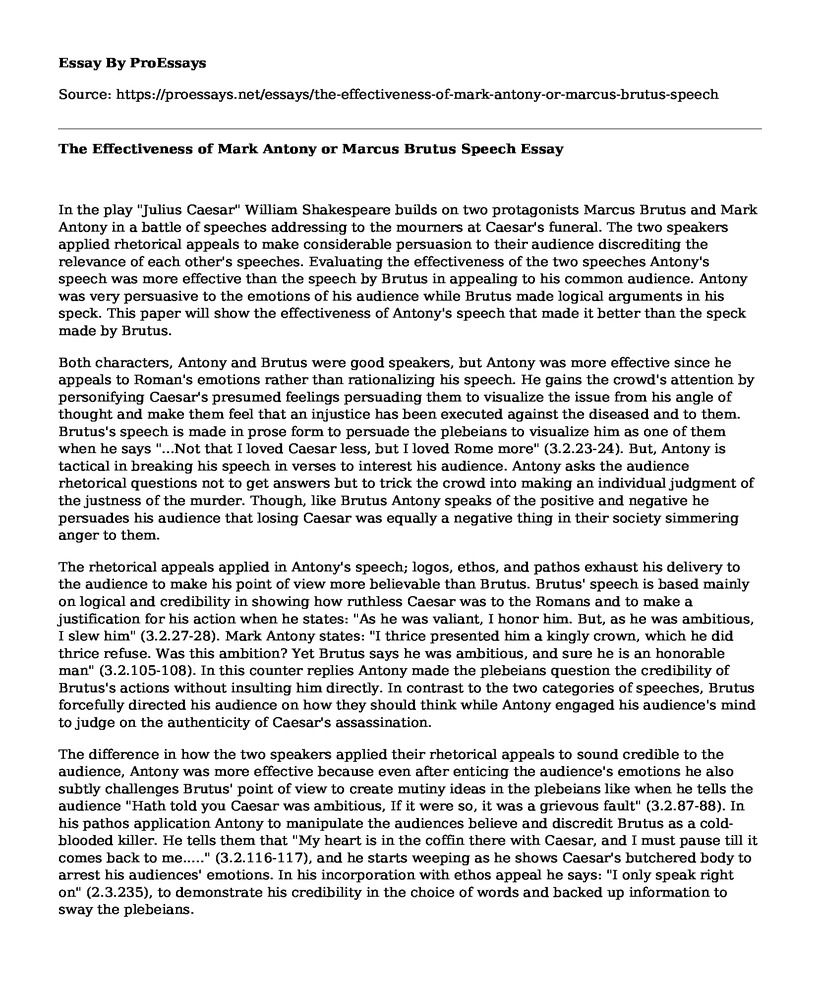In the play "Julius Caesar" William Shakespeare builds on two protagonists Marcus Brutus and Mark Antony in a battle of speeches addressing to the mourners at Caesar's funeral. The two speakers applied rhetorical appeals to make considerable persuasion to their audience discrediting the relevance of each other's speeches. Evaluating the effectiveness of the two speeches Antony's speech was more effective than the speech by Brutus in appealing to his common audience. Antony was very persuasive to the emotions of his audience while Brutus made logical arguments in his speck. This paper will show the effectiveness of Antony's speech that made it better than the speck made by Brutus.
Both characters, Antony and Brutus were good speakers, but Antony was more effective since he appeals to Roman's emotions rather than rationalizing his speech. He gains the crowd's attention by personifying Caesar's presumed feelings persuading them to visualize the issue from his angle of thought and make them feel that an injustice has been executed against the diseased and to them. Brutus's speech is made in prose form to persuade the plebeians to visualize him as one of them when he says "...Not that I loved Caesar less, but I loved Rome more" (3.2.23-24). But, Antony is tactical in breaking his speech in verses to interest his audience. Antony asks the audience rhetorical questions not to get answers but to trick the crowd into making an individual judgment of the justness of the murder. Though, like Brutus Antony speaks of the positive and negative he persuades his audience that losing Caesar was equally a negative thing in their society simmering anger to them.
The rhetorical appeals applied in Antony's speech; logos, ethos, and pathos exhaust his delivery to the audience to make his point of view more believable than Brutus. Brutus' speech is based mainly on logical and credibility in showing how ruthless Caesar was to the Romans and to make a justification for his action when he states: "As he was valiant, I honor him. But, as he was ambitious, I slew him" (3.2.27-28). Mark Antony states: "I thrice presented him a kingly crown, which he did thrice refuse. Was this ambition? Yet Brutus says he was ambitious, and sure he is an honorable man" (3.2.105-108). In this counter replies Antony made the plebeians question the credibility of Brutus's actions without insulting him directly. In contrast to the two categories of speeches, Brutus forcefully directed his audience on how they should think while Antony engaged his audience's mind to judge on the authenticity of Caesar's assassination.
The difference in how the two speakers applied their rhetorical appeals to sound credible to the audience, Antony was more effective because even after enticing the audience's emotions he also subtly challenges Brutus' point of view to create mutiny ideas in the plebeians like when he tells the audience "Hath told you Caesar was ambitious, If it were so, it was a grievous fault" (3.2.87-88). In his pathos application Antony to manipulate the audiences believe and discredit Brutus as a cold-blooded killer. He tells them that "My heart is in the coffin there with Caesar, and I must pause till it comes back to me....." (3.2.116-117), and he starts weeping as he shows Caesar's butchered body to arrest his audiences' emotions. In his incorporation with ethos appeal he says: "I only speak right on" (2.3.235), to demonstrate his credibility in the choice of words and backed up information to sway the plebeians.
Conclusion
In conclusion, I think Antony made effectiveness in his speech over Brutus because of his tactical manipulation of the three rhetorical appeals throughout. His speech was also much longer to give more persuasive facts to make his appeals unforgettable by his audience.
Works Cited
Shakespeare, William Arthur Humphreys, ed. Julius Caesar. Oxford University Press. 1999, p. 8. ISBN 0-19-283606-4.
Cite this page
The Effectiveness of Mark Antony or Marcus Brutus Speech. (2022, May 06). Retrieved from https://proessays.net/essays/the-effectiveness-of-mark-antony-or-marcus-brutus-speech
If you are the original author of this essay and no longer wish to have it published on the ProEssays website, please click below to request its removal:
- The Astronauts by Robert Hayden - Poetry Analysis Essay
- Literary Analysis Essay on Eve's Diary
- Essay Example on The Color of Water: Racism, Comfort, & Symbols
- Essay Sample on Medea: A Woman with Unparalleled Power and Characteristics
- Essay Example on Cat in the Rain: Underappreciated Classic of the 20th Century
- Essay Example on Shakespeare's Exceptional Talents: A Thematic Analysis
- Passing By Nella Larsen - Book Review Example







